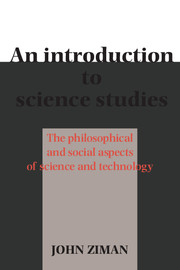Book contents
- Frontmatter
- Contents
- Preface
- 1 ‘Academic’ science
- 2 Research
- 3 Validity
- 4 Communication
- 5 Authority
- 6 Rules and norms
- 7 Change
- 8 The sociology of scientific knowledge
- 9 Science and technology
- 10 Pure and applied science
- 11 Collectivized science
- 12 R & D organizations
- 13 The economics of research
- 14 Science and the State
- 15 The scientist in society
- 16 Science as a cultural resource
- Index
- Frontmatter
- Contents
- Preface
- 1 ‘Academic’ science
- 2 Research
- 3 Validity
- 4 Communication
- 5 Authority
- 6 Rules and norms
- 7 Change
- 8 The sociology of scientific knowledge
- 9 Science and technology
- 10 Pure and applied science
- 11 Collectivized science
- 12 R & D organizations
- 13 The economics of research
- 14 Science and the State
- 15 The scientist in society
- 16 Science as a cultural resource
- Index
Summary
‘Scientific revolutions are not made by scientists. They are declared post factum, often by philosophers and historians of science rather than by scientists themselves.’
Hendrik CasimirCognitive change
The world's scientific archives acquire something like a million new scientific papers a year. The growth in the quantity of scientific information was, until quite recently, an accelerating process. The number of papers published annually has been increasing exponentially for the best part of 300 yean. An elementary calculation shows that this corresponds to an annual growth rate of about 5%: that is to say, the amount of new scientific information reported each year has been doubling about every 15 years, since the late seventeenth century.
The steady growth in its contents and in the scale of its operations has very important implications for the place of science in society (chapter 11). It is also one of its major internal characteristics. At this rate of growth, for example, half the information in a scientific archive must be less than 15 years old. Perhaps only a tiny fraction of this information is scientifically interesting or novel. Much of it will consist of factual data on very minor topics, recorded at higher levels of precision than previously. Nevertheless, unless the norm of originality (§6.2) is being systematically violated, scientific knowledge is changing rapidly by the sheer accumulation of new information.
- Type
- Chapter
- Information
- An Introduction to Science StudiesThe Philosophical and Social Aspects of Science and Technology, pp. 91 - 101Publisher: Cambridge University PressPrint publication year: 1984



